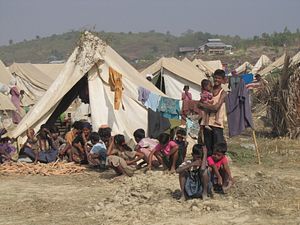The United States’ democracy and human rights concerns have long put Washington at odds with Southeast Asian governments. But during this month or so, these issues have really been in the spotlight in several countries at once.
In Myanmar, nationalist monks staged a protest after the U.S. embassy used the word ‘Rohingya’ in an official statement. In Thailand, some parliament leaders want the U.S. ambassador expelled for expressing concern about the country’s human rights record. And in the Philippines, President-elect Rodrigo Duterte threatened to sever ties with the United States after the U.S. envoy criticized him during the campaign period.
On April 19, Rohingya boat refugees perished in an accident. The tragedy prompted the U.S. embassy to issue a statement expressing condolences to the family of the victims. But nationalist monks condemned the embassy for using the term Rohingya. In Myanmar, the Rohingya are considered as illegal immigrants although global human rights groups describe them as a persecuted ethnic group. The majority of the Rohingya are Muslims while Myanmar has a predominantly Buddhist population.
The government didn’t authorize the holding of a protest in front of the U.S. embassy but the Ministry of Foreign Affairs has asked the international community to stop using the word Rohingya.
When the chairman of the government’s legal review committee met with U.S. Ambassador Scot Marciel, the latter was reminded to be “careful” about using a term that “the Myanmar people can’t accept.” The ambassador reportedly concurred with the request.
In Thailand, Prime Minsiter Prayut Chan-o-cha is questioning the right of U.S. Ambassador Glyn T. Davies to criticize the policies of his government. He said the remarks of Davies about the country’s human rights record has angered many Thais.
“Is Thailand a U.S. colony? Have his opinions backfired on him? More Thai people hold a grudge against him and it’s me who has to calm them down,” Prayut said in a media interview.
Davies was defending the statement of the U.S. State Department which deplored the recent arrests of anti-junta activists. Several critics were also charged because of their ‘subversive’ posts on Facebook.
“These actions create a climate of intimidation and self-censorship,” Davies said in a press conference.
Aside from Prayut, several politicians also lambasted Davies for ‘interfering’ in Thailand’s affairs. Some wanted him to be declared persona non grata while others urged the government to send him back to the United States
Meanwhile, in the Philippines, one of the issues that trended during the presidential campaign was the threat made by then candidate Duterte to sever ties with the United States after its ambassador reacted to the rather crude gang rape joke made by the Davao City mayor.
Duterte joked in a campaign rally that during a hostage incident in a Davao jail where an Australian was gang raped by inmates, as mayor of the city he should be the first to rape the victim. The joke was widely condemned by women’s groups, church leaders, netizens, and Duterte’s political rivals.
U.S. Ambassador Philip Goldberg was one of those who publicly commented about the rape joke.
He said in a media interview that “statements by anyone, anywhere that either degrade women or trivialize issues so serious as rape or murder are not ones that we condone.”
Responding to the criticism, Duterte said: “You’re not Filipinos. Shut up. Do not interfere because it’s election time.” Then, he added that it’s fine with him if the United States will sever ties with the Philippines.
Duterte later clarified that he was only responding to a question from the media.
Although he is yet to be proclaimed as president, Duterte is the clear landslide winner in the elections. President Obama has already phoned Duterte to congratulate him and the Philippines’ ‘vibrant democracy.’
A week after the elections, Duterte faced the media for the first time and revealed what he intends to discuss this with Goldberg who is expected to visit the president-elect in the coming days.
“I would only ask the U.S. ambassador, are you with us?’” Duterte said, referring to the ongoing maritime dispute between the Philippines and China.

































